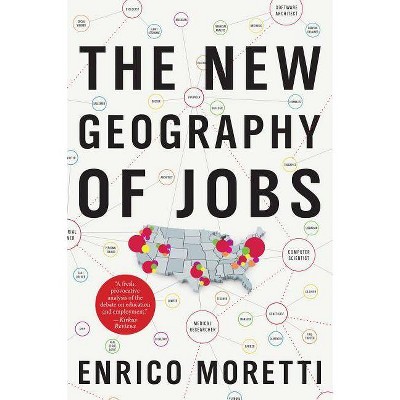The New Geography of Jobs - by Enrico Moretti (Paperback)

Similar Products
Products of same category from the store
AllProduct info
<p/><br></br><p><b> About the Book </b></p></br></br><b>In <i>The New Geography of Jobs, </i> award-winning Berkeley economist Enrico Moretti looks at the major shifts taking place in the US economy and reveals the surprising winners and losers -- specifically, which kinds of jobs will drive economic growth and where they'll be located -- while exploring how communities can transform themselves into dynamic innovation hubs</b>.<p/><br></br><p><b> Book Synopsis </b></p></br></br><b>In <i>The New Geography of Jobs, </i> award-winning Berkeley economist Enrico Moretti looks at the major shifts taking place in the US economy and reveals the surprising winners and losers -- specifically, which kinds of jobs will drive economic growth and where they'll be located -- while exploring how communities can transform themselves into dynamic innovation hubs.</b> <p/><b>"A timely and smart discussion of how different cities and regions have made a changing economy work for them -- and how policymakers can learn from that to lift the circumstances of working Americans everywhere." -- Barack Obama</b> <p/> We're used to thinking of the United States in opposing terms: red versus blue, haves versus have-nots. But today there are three Americas. At one extreme are the brain hubs -- cities like San Francisco, Boston, and Durham -- with workers who are among the most productive, creative, and best paid on the planet. At the other extreme are former manufacturing capitals, which are rapidly losing jobs and residents. The rest of America could go either way. <p/> For the past thirty years, the three Americas have been growing apart at an accelerating rate. This divergence is one the most important developments in the history of the United States and is reshaping the very fabric of our society, affecting all aspects of our lives, from health and education to family stability and political engagement. But the winners and losers aren't necessarily who you'd expect. <p/> Enrico Moretti's groundbreaking research shows that you don't have to be a scientist or an engineer to thrive in one of the brain hubs. Carpenters, taxi drivers, teachers, nurses, and other local service jobs are created at a ratio of five-to-one in the brain hubs, raising salaries and standard of living for all. Dealing with this split -- supporting growth in the hubs while arresting the decline elsewhere -- is the challenge of the century, and <i>The New Geography of Jobs</i> lights the way.<p/><br></br><p><b> From the Back Cover </b></p></br></br>"A persuasive look at why some U.S. cities have prospered in recent decades while others have declined." "Bloomberg Businessweek"We re used to thinking of the United States in opposing terms: red versus blue, haves versus have-nots. But today there are "three "Americas. At one extreme are the brain hubs cities like San Francisco, Boston, and Durham with workers who are among the most productive, creative, and best paid on the planet. At the other extreme are former manufacturing capitals, which are rapidly losing jobs and residents. The rest of America could go either way. For the past thirty years, the three Americas have been growing apart at an accelerating rate. This divergence is one the most important developments in the history of the United States and is reshaping the very fabric of our society, affecting all aspects of our lives, from health and education to family stability and political engagement. But the winners and losers aren t necessarily who you d expect.Enrico Moretti s groundbreaking research shows that you don t have to be a scientist or an engineer to thrive in one of the brain hubs. Carpenters, taxi-drivers, teachers, nurses and other local service jobs are created at a ratio of five-to-one in the brain hubs, raising salaries and standard of living for all. Dealing with this split supporting growth in the hubs while arresting the decline elsewhere is the challenge of the century, and "The New Geography of Jobs" lights the way."Moretti has written a clear and insightful account of the economic forces that are shaping America and its regions, and he rightly celebrates human capital and innovation as the fundamental sources of economic development." Jonathan Rothwell, The Brookings Institution[AU Photo] Enrico Moretti is Professor of Economics at the University of California, Berkeley, and the recipient of several international honors, including a Fulbright Fellowship and the IZA Young Labor Economist Award. His research is supported by the National Science Foundation, the National Institutes of Health and several private foundations and has been featured in the "New York Times," "Wall Street Journal," "Forbes, " "CNN, PBS," and "NPR," among others.<P>"<p/><br></br><p><b> Review Quotes </b></p></br></br><br><p>"A persuasive look at why some U.S. cities have prospered in recent decades while others have declined." <br> --<b>Bloomberg Businessweek </b></p><p>"Moretti has written the most important book of the year, I can't recommend it enough. The Cal-Berkeley economic professor's book is extremely necessary for politicians and commentators alike, book that artfully slays myriad myths that cloud the economic debate. Brilliant." <br><b>--</b><i><b>Forbes </b></i></p><p>"Enrico Moretti is a first-rate empirical researcher who has taught us much about the geographic impact of human capital and a variety of public investments. His book, <i>The New Geography of Jobs</i>, is well-written and filled with important facts and wise policy advice. It is an excellent addition to the literature on the economics of place. [...] Both local policymakers and national leaders interested in policies with a geographical edge would do well to read the book." <br><b>--Edward Glaeser, author of </b><i><b>The Triumph of the City</b></i></p><p>"Decade after decade, smart and educated people flock away from Merced, Calif., Yuma, Ariz., Flint, Mich., and Vineland, N.J. In those places, less than 15 percent of the residents have college degrees. They flock to Washington, Boston, San Jose, Raleigh-Durham and San Francisco. In those places, nearly 50 percent of the residents have college degrees. As Enrico Moretti writes in <i>The New Geography of Jobs</i>, the magnet places have positive ecologies that multiply innovation, creativity and wealth. The abandoned places have negative ecologies and fall further behind. This sorting is self-reinforcing, and it seems to grow more unforgiving every year." <br><b>--David Brooks, </b><b></b><i><b>The New York Times</b></i></p><p> <br> "<i>The New Geography of Jobs</i>, examines how and why hiring is stronger in some U.S. cities than in others." <br><b>--PBS </b><i><b>NewsHour</b></i></p><p>"In a new book, <i>The New Geography of Jobs</i>, University of California at Berkeley economics professor Enrico Moretti argues that for each job in the software, technology and life-sciences industries, five new jobs are indirectly created in the local economy. The jobs range from yoga instructors to restaurant owners. Mr. Moretti calculated such a multiplier effect by examining U.S. Census Bureau data from eight million workers in 320 areas during the past 30 years. Mr. Moretti says the data support the argument that technology innovators are one of the most important engines of job creation in the U.S.--with three of those five jobs going to people without college degrees." <br><b>--</b><i><b>The Wall Street Journal </b></i></p><p>"Moretti has written a clear and insightful account of the economic forces that are shaping America and its regions, and he rightly celebrates human capital and innovation as the fundamental sources of economic development." <br><b>--</b><i><b>The New Republic</b></i><b></b></p><p>"Compelling" <br><b>--</b><i><b>Slate </b></i></p><p>"Whatever this month unemployment report turns out to be, it's probably not going to be great news for the Rust Belt. Best guesses are manufacturing jobs are still scarce. Meanwhile, new economy places like Silicon Valley continue to thrive. The difference? Location, location, location. So says economist Enrico Moretti in his latest book, <i>The New Geography of Jobs</i>." <br><b>--</b><i><b>NPR MarketPlace</b></i></p><p>"A bold vision." <br><i><b>--MIT Sloan Management Review</b></i></p><p>"It is a great and disturbing book about the sweeping changes that are going on in American communities." <br><b>--Reuters</b></p><p>"Moretti's book suggests that for each additional job in the average high-tech firm, five additional jobs are created outside that firm in the local community." <br><b>--NPR </b><i><b>All Things Considered</b></i></p><p>"Economist Enrico Moretti finds that earnings of a high school graduate increase 7% for every 10% increase in the percent of people in a city that are college graduates. While having more high-skilled workers around tends to raise everyone's salaries, Moretti's research shows that low-skilled workers benefit four to five times more than college graduates. Even as liberals work to find a way to counteract the problem of the 1 percent, they should view high skilled immigrants as a step toward turning America back into a true middle-class society." <br><b>--</b><i><b>The Atlantic </b></i></p><p>"Professor Moretti is a visionary scholar and one of the most important new voices in economics." <br><b>--</b><i><b>The Costa Report</b></i></p><p>"The book is an inviting read. It is dense with ideas, but spiced liberally with local detail" <br><b>--</b><i><b>The Journal of Economic Geography</b></i><b></b></p><p>"The choice of where you live is the most important choice an American worker can make today." <br><b>--</b><i><b>The Dylan Ratigan Show</b></i><b>, MSNBC </b></p><p>"A fresh, provocative analysis of the debate on education and employment. . . A welcome contribution from a newcomer who provides both a different view and balance in addressing one of the country's more profound problems." <br><b>--</b><i><b>Kirkus Reviews</b></i></p><p>"If there's one current book I'd recommend to leaders in American cities today, it's Enrico Moretti's <i>The New Geography of Jobs</i>." <br><b>--</b><i><b>The Urbanophile</b></i></p><p>"An important new book." <br><b>--</b><i><b>The American</b></i></p><p>"<i>The New Geography of Jobs</i> is arguably the most important book about urban economics published this year. Author Enrico Moretti, an Italian-born economics professor at Berkeley, analyzes the great divergence occurring between metropolitan regions in the United States. While much of his narrative about the innovation sector as the key driver in regional growth will be familiar to readers of Richard Florida, Moretti provides a valuable counter-balance to Florida's theories about the creative class." <br><b>--</b><i><b>Bacon's Rebellion</b></i></p><p>"Moretti's book is well-written, well-argued, and important. <i>The New Geography of Jobs</i> is the sort of economics that should be widely read, digested, and discussed." <br><b>--</b><i><b>The Digital Quad</b></i></p><p>"The message of his very well written and prize winning book is important. And Enrico is right that we should pay attention to the geography of where smart people are choosing to work, play, and live their lives. Ultimately, it has consequences for all of us." <br><b>--</b><i><b>The Creativity Post </b></i></p><p>"If you're thinking of a career change or new employment, or if job creation is your Number One priority this year, this is a book you'll want first. You'll need solid, hard-core information to do it. And for that, <i>The New Geography of Jobs</i> is hard to resist." <br><b>--</b><i><b>Independent News</b></i></p><p>"Enrico Moretti has written an important book that every student of local economic development should read. His perspective is dynamic, placing the present situation in the context of the evolution of industrial production and labor markets over the past 50 years." <br><b>--</b><i><b>Berkeley Planning Journal </b></i></p><p>"Wow. . . Without referring to Charles Murray, Moretti blows <i>Coming Apart</i> totally out of the water, replacing Murray's moralistic sociology with solid economics." <br><b>--</b><i><b>EconLog </b></i></p><p>"Moretti has done a good deed by sitting down to write. He's clear and concise. He has writer's knack for pulling out the illustrative detail while never losing the broad sweep of events. It is truly a skill to be equally at home in the abstract realm of statistics and the very emotion-laden world of human decision-making. Most economists forget that the conclusions they draw from their sample populations also contain the drama of people's actual lives within them. Moretti remembers this while avoiding another trap of economists. He doesn't leave his story in the realm of the theoretical, but constantly brings his tale back to real-world existence in a way that amplifies the argument by making it coincide with everyday experience. Most importantly, he knows his subject well and he's talking about something that is shaping our future more than we realize." <br><b>--Sam Seidel</b><i><b></b></i></p><p>"We are habituated to thinking about U.S. inequality across people: By education, race, and ethnicity. Moretti convincingly demonstrates that the inequalities that matter most in early 21st century America are the differences across places. An individual standard of living is increasingly determined by where she lives, not just what she does. Wages are higher, and unemployment lower, for workers living in an "innovation cluster" than for comparably educated workers outside of these privileged places." <br><b>--</b><i><b>Inside Higher Ed</b></i></p><p>"In <i>The New Geography of Jobs</i>, Moretti explains how innovative industries bring 'good jobs' and high salaries to the communities where they cluster, and their impact on the local economy is much deeper than their direct effect." <br><b>--</b><i><b>Buffalo Rising </b></i></p><p> "[A] persuasive look at why some U.S. cities have prospered in recent decades while others have declined." <br><b>--James Pressley, </b><i><b>Bloomberg - Businessweek</b></i></p><p> <br> "<i>The New Geography of Jobs </i>explains the major shifts taking place in the United States economy and reveals the surprising winners and losers--specifically, which jobs will drive economic growth and where they'll be located. Which communities will transform themselves into dynamic innovation hubs in 2012 and beyond? It can be done.Get educated, get a map and get going!" <br><b>--Troy Onink, </b><i><b>Forbes</b></i></p><p> <br> "In a new book, <i>The New Geography of Jobs</i>, University of California at Berkeley economics professor Enrico Moretti argues that for each job in the software, technology and life-sciences industries, five new jobs are indirectly created in the local economy. The jobs range from yoga instructors to restaurant owners. Mr. Moretti calculated such a multiplier effect by examining U.S. Census Bureau data from eight million workers in 320 areas during the past 30 years. By comparison, he found that just 1.6 local jobs were created for every new job in the manufacturing industry during the same period. Mr. Moretti says the data support the argument that technology innovators are one of the most important engines of job creation in the U.S.--with three of those five jobs going to people without college degrees." <br><b>--Jessica E. Vascellaro, </b><i><b>Wall Street Journal</b></i></p><p> <br> "The book is excellent, I strongly recommend it." <br><b>-- </b><i><b>Forbes</b></i><b> (Adam Ozimek)</b> <p/> <br><b><b>"</b></b>What explains the wide range of economic growth and prosperity across U.S. regions, and why is it so hard for struggling metro areas to reverse multi-decade trends? These are the questions that urban economist Enrico Moretti addresses in <i>The New Geography of Jobs</i>. In his vision, innovative workers and companies create prosperity that flows broadly, but these gains are mostly metropolitan in scale, meaning that geography substantially determines economic vitality. [...] Moretti has written a clear and insightful account of the economic forces that are shaping America and its regions, and he rightly celebrates human capital and innovation as the fundamental sources of economic development." <br><b>-- Brookings Institution (Jonathan Rothwell) </b> <p/> "Enrico Moretti's, <i>The New Geography of Jobs</i> has been exceptionally well received by many of the economic development literati. Some commentators have described <i>New Geography</i> as the best economic development book of 2012. And if you don't read <i>New Geography</i>, you would also miss reading the best, most readable explanation and defense of innovation, knowledge-based economics and their effects on the location of jobs in the United States. There is a lot going on in <i>New Geography</i>." <br><i><b>-- </b></i><b>Journal of Applied Research in Economic Development</b> <p/> "Prof. Moretti's findings are both significant and provocative." <br><b>-- Institute for Research on Labor and Employment </b><b></b> <p/> "<i>The New Geography of Jobs, </i> by Enrico Moretti of U.C. Berkeley, provides an excellent big-picture analysis of the increasingly divergent outlook for our nation's cities and delves into the reasons why this disparity is likely to widen. [...] Highly recommended, a compelling read!" <br><b>-- </b><i><b>Talking about Finance</b></i><b> (Eric Von Berg) </b> <br> </p><p>"This book convincingly argues that an unprecedented redistribution of jobs, population and wealth is underway in this country." <br><b>-- CNBC</b></p><p> <br> "Remember author Thomas Friedman's argument that the world was flat, and where you lived didn't matter, because with e-mail, cell phones, and the Internet, you could do business all over the world? Berkeley economist Enrico Moretti pretty much says "that is so 10 years ago!" In fact, Moretti says the opposite has happened. There's a sea change going on, a redistribution of population and wealth fueled by innovative companies that need to be in ecosystems to thrive." <br><b>-- NPR Here and Now</b></p><p> <br> "Politicians from both parties, acutely aware that voters are giving a critical eye to the unemployment rate, continue to tout a rebirth in American manufacturing as the key to job growth. However, not everyone agrees that more manufacturing equals more jobs. In his book <i>The New Geography of Jobs</i>, University of California at Berkeley economics professor Enrico Moretti argues that, contrary to conventional wisdom, the information economy is a driver of job growth. The problem, according to Moretti, is that we often look at places like Palo Alto, Calif., with its office parks, Stanford University campus and ambitious entrepreneurs, and fail to recognize the ripples that tech companies send through the greater economy. Using reams of U.S. Census data, Moretti estimates that for every job created by the likes of Apple or Cisco Systems, another five jobs are added in the local service industry." <br><b>--</b><b>Terrence Murray, </b><i><b>The Financialist</b></i></p><p> <br> "Excellent" <br><b>--</b><i><b>The National Review </b></i></p><p> <br> "<i>The New Geography of Jobs</i> by Enrico Moretti offers a readable and comprehensive view of the economic forces at work in the nation's metropolitan areas. Moretti, an economist at the University of California Berkeley, offers a comprehensive and non-technical discussion of the shift to a knowledge-based economy, the growing importance of human capital to individual and community economic success, and the critical role played by industry clustering in driving innovation and productivity. For Moretti, this shift to a knowledge economy means the economic prospects of cities are diverging: adaptable places with talent are becoming more prosperous, while those with less talent and locked in to traditional industries struggle." <br><b>--</b><i><b>The Huffington Post</b></i></p><p> <br> "<i>The New Geography of Jobs</i> has affected the way I see the world." <br><b>--Jim Russell</b></p><p> <br> "Some economic texts get lost in the minutia. However, <i>The New Geography of Jobs</i> takes a step back to revel in the Big Picture where the real patterns of commerce can be explored." <br><b>--Carrie B. Reyes</b></p><p> <br> "This important book by a U. Cal Berkeley economics professor contains vital insights and data about the nature of jobs in our new economy. The thesis he unveils is, at its core, extraordinarily encouraging because American innovators have so much untapped potential. Moretti gets special points for observing that Friedman's The World Is Flat thesis is simply wrong. In Moretti's opinion the data don't support this view. And despite all the hype about the "death of distance" and the "flat world", where you live matters more than ever." <br><b>--Mark Mills, </b><i><b>Forbes</b></i></p><p> <br> "Just finished Cal economist Enrico Moretti's excellent <i>The New Geography of Jobs</i>. Moretti has a way of looking at things we all know in new and refreshing ways." <br><b>--Mike Cassidy, Silicon Beat</b></p><p> <br> "In his book <i>The New Geography of Jobs</i>, Moretti unpacks the forces that are reshaping America. Whereas the 20th century was defined by physical capital producing physical goods, the 21st century is increasingly driven by human capital and its output of innovation and knowledge. Smart people tend to cluster into globally competitive "brain hubs" that, in Moretti's eyes, will form the basis for much of America's future prosperity." <br><b>--</b><i><b>Free Enterprise</b></i></p><p> <br> "I highly recommend to everyone in business or wanting to be in business." <br><b>--Kathleen Quinn Votaw </b></p><br><p/><br></br><p><b> About the Author </b></p></br></br>ENRICO MORETTI is a professor of economics at the University of California, Berkeley, whose research has been supported by the National Science Foundation and the National Institutes of Health, and has been featured in the <i>New York Times</i>, the <i>Wall Street Journal</i>, and <i>Slate</i>, among other publications.
Price History
Cheapest price in the interval: 8.39 on November 8, 2021
Most expensive price in the interval: 8.39 on December 20, 2021
Price Archive shows prices from various stores, lets you see history and find the cheapest. There is no actual sale on the website. For all support, inquiry and suggestion messages communication@pricearchive.us




















